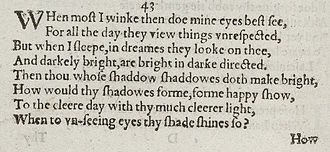Sonnet 43
Q1
Q2
Q3
C
When most I wink, then do mine eyes best see,
For all the day they view things unrespected;
But when I sleep, in dreams they look on thee,
And, darkly bright, are bright in dark directed.
Then thou, whose shadow shadows doth make bright,
How would thy shadow’s form form happy show
To the clear day with thy much clearer light,
When to unseeing eyes thy shade shines so!
How would, I say, mine eyes be blessed made
By looking on thee in the living day,
When in dead night thy fair imperfect shade
Through heavy sleep on sightless eyes doth stay!
All days are nights to see till I see thee,
And nights bright days when dreams do show thee me.
4
8
12
14
William Shakespeare's Sonnet 43 employs antithesis and paradox to highlight the speaker's yearning for his beloved and sadness in (most likely) their absence, and confusion about the situation described in the previous three sonnets. Sonnet 27 similarly deals with night, sleep, and dreams.
Sonnet 43 is an English or Shakespeare sonnet. English sonnets contain three quatrains, followed by a final rhyming couplet. It follows the form's typical rhyme scheme, abab cdcd efef gg and is written in iambic pentameter, a type of poetic metre based on five pairs of metrically weak/strong syllabic positions per line. The first line of the couplet exemplifies a regular iambic pentameter:
The second and fourth lines have a final extrametrical syllable or feminine ending:
This is one of the poems omitted from the pirated edition of 1640. Gerald Massey notes an analogous poem in Philip Sidney's Astrophil and Stella, 38.
Stephen Booth notes the concentration of antithesis used to convey the impression of a speaker whose emotions have inverted his perception of the world.
Edmond Malone glosses "unrespected" as "unregarded." Line 4 has received a number of broadly similar interpretations. Edward Dowden has "darkly bright" as "illumined, though closed"; he glosses the rest of the line "clearly directed in the darkness." Sidney Lee has the line "guided in the dark by the brightness of your shadow," while George Wyndham prefers "In the dark they heed that on which they are fixed."
...
Wikipedia

